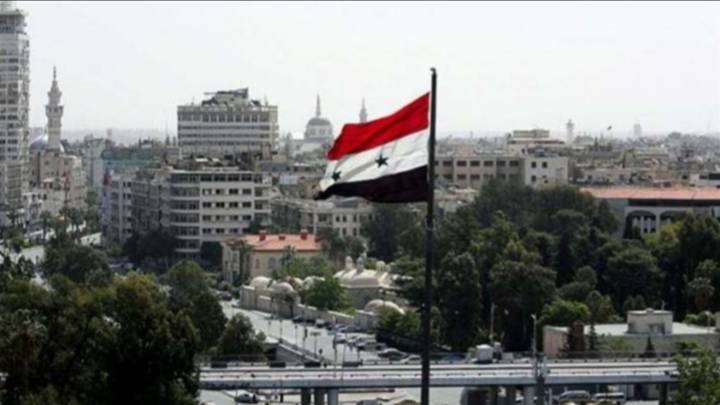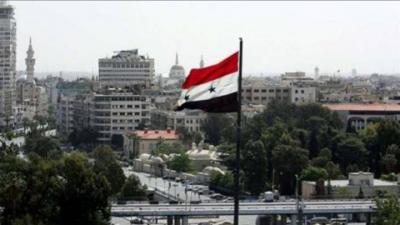The protocol issue may have hindered the arrangement of the Lebanese delegation's visit to Syria tomorrow. There may have been urgency or "influence" exerted by some Lebanese to arrange a communication in a way that displayed disregard, leading to a Syrian protest manifesting in the announcement of a lack of prior agreement on the date. It was made clear that the matter was limited to an initial contact between Presidents Michel Aoun and Bashar al-Assad to commence measures for delineating maritime borders between the two countries.
Meanwhile, the late awakening to the maritime border delineation file with Syria on the eve of President Michel Aoun’s departure from the Baabda Palace remains a "mystery." The Syrian response interrupted the political scene at night after the Syrian government announced the cancellation of "the visit scheduled for (tomorrow) Wednesday" and sent a message to the Lebanese Foreign Ministry stating that "the time is not suitable for such a visit.” This was not anticipated by those involved, who mistakenly believed that Syria would open the door to a Lebanese outreach that remained confined to unofficial and undeclared channels, despite the estrangement imposed by the governments in compliance with the West, specifically the United States. Moreover, the President of the Republic had not taken any steps to break this estrangement.
It may have been overlooked by those who hurried or "rushed" to "harvest" this file and register it as an achievement that many circumstances and considerations cannot be ignored by Damascus, along with its refusal to engage on a "piecemeal" basis. All these matters and reasons were not mentioned in the message that arrived in Beirut, but for those familiar with the details and atmosphere of the relationship, this response was not surprising.
The official or semi-official narrative communicated by those concerned with the file states that "a lack of coordination led to what happened," especially since "Deputy Speaker Elias Bou Saab did not communicate with Syrian officials to set a date," and that "Wednesday was designated unilaterally by the Lebanese side, and not based on the call made by President Michel Aoun to President Bashar al-Assad, which was general and did not touch on logistical details."
The "real" backgrounds that various Syrian sources and others close to Damascus agree upon confirm the following: First, there was no agreement on a date or meetings; even the Lebanese delegation (which included Deputy Speaker Elias Bou Saab, Foreign Minister Abdallah Bou Habib, Minister of Public Works Ali Hamiyah, and General Director of Public Security Major General Abbas Ibrahim) did not have an agenda or timetable, but was waiting for the set dates specifically. It is not true that Wednesday was selected as this date was revealed by the Lebanese side without a prior agreement with the Syrian side, which is an incomprehensible matter. Lebanon is supposed to request the date, and Syria should set the date.
Second, the "call that took place between Aoun and Assad was positive, but the agreement to continue discussions was general."
Third, Damascus expressed surprise that the decision to engage in dialogue with it was not shared with other officials, particularly Speaker Nabih Berri and Prime Minister Najib Mikati.
Additionally, sources revealed that the Syrians had previously informed Lebanon that work was ongoing from the Syrian side and that contracts with Russian companies were in place and that the discussions could not be approached in a manner of "embarrassment." Furthermore, Damascus seeks a different Lebanese stance regarding the ambiguous official relations with Syria, as Lebanese governments continue to take steps to appease the West and persist in boycotting Syria, limiting relations to unofficial security coordination and public relations. Lebanon has even neglected to appoint a new ambassador in Damascus while Syria prepares to send a seasoned Syrian diplomat to Beirut amid rumors that Lebanon is preparing to select a third-tier diplomat!
While the dialogue aims to address the issue of overlap between Block 1 on the Syrian side (off the coast of Tartus Governorate) and Lebanese Blocks 1 and 2 over a marine area extending between 750 and 1,000 square kilometers, it must be considered that Syria signed a contract in March 2011 with the Russian company "Capital" for oil and gas exploration and production in Block 1. Therefore, Lebanon must recognize that negotiations about the borders, as well as the fields and works, must involve the Russian side, which provides protection for all operations in that area.
Despite Russia being displeased with all Lebanese behavior towards Moscow since the outbreak of the war in Ukraine, it does not show opposition to cooperation, but rather offered assistance in resolving the matter, while Lebanon must realize that the Russians will operate in that area and that no other global companies will do so. It is unacceptable for Lebanon to impose a veto on working with Russian companies based on American desires.




